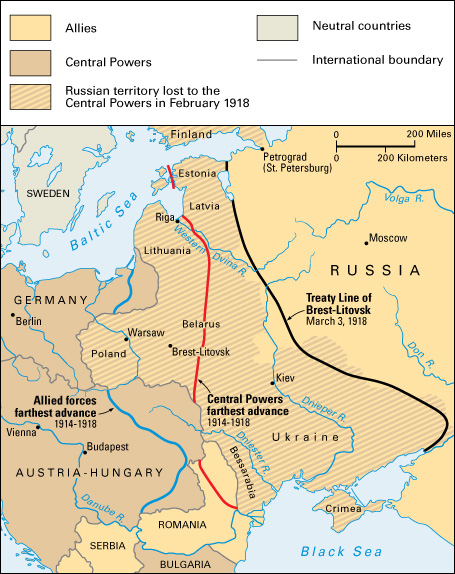Brest-Litovsk, Treaty of, was an agreement that ended Russia’s participation in World War I (1914-1918). Russia had been involved in the war alongside more than 20 other countries, collectively known as the Allies. The Allies opposed the Central Powers, which consisted of Germany, Austria-Hungary, Bulgaria, and the Ottoman Empire. Russia and the Central Powers signed the treaty in Brest-Litovsk (now Brest, Belarus) on March 3, 1918.
The Treaty of Brest-Litovsk was signed during a period of transition in Russia. The Bolsheviks—the group that later became the Communist Party—had seized control of Russia’s government in November 1917 (October 1917 in the Russian calendar used before 1918). Russia had suffered major losses during World War I, and its army’s resources were depleted. The Bolsheviks hoped to end the country’s involvement in the war, and the group’s leader, V. I. Lenin, called for peace talks with Germany. Leon Trotsky, a Bolshevik leader and Russia’s commissar of foreign affairs, met with German leaders in Brest-Litovsk to reach an agreement. He sought to end the fighting between Russia and Germany without giving up territory. However, Germany demanded all lands that its armies occupied.
Germany’s demands caused a major split within the Russian government. Some Bolsheviks wanted to continue battling, but Lenin insisted on ending the war with Germany at any price. Trotsky incorrectly believed that Germany would stop fighting in the war if Russia did. Lenin believed that the agreement with Germany, despite its harsh terms, provided the “breathing space” the Bolsheviks needed if they were to stay in power.
The Central Powers invaded Russia in February 1918. They quickly overran large parts of western Russia and increased their already severe demands. With no option but to sign the treaty, Russia gave up large amounts of its territory, including Bessarabia (now mostly in Moldova), Estonia, Finland, Latvia, Lithuania, Ukraine, part of Belarus, the part of Poland that had been ruled by Russia, and a small piece of territory at the northeastern corner of what is now Turkey. Russia also lost much of its coal supply, industry, and railroads.

The treaty ended the fighting between Russia and the Central Powers and saved the Bolsheviks from further losses in the war. It also gave Lenin’s government time to put down revolts in Russia. However, the treaty angered the Allies because it ended the fighting on the Eastern Front and freed German troops for use on the Western Front. In the spring of 1918, Allied troops arrived in Russia to prevent the Germans from seizing arms. The Allies also offered money and arms to groups in Russia that opposed the Bolsheviks. These actions contributed to what rapidly became a devastating civil war between the Communists and the anti-Communists in Russia. The Russian government revoked the treaty in November 1918, following Germany’s defeat in the war. The Russian Communist forces then moved to occupy much of the territory that had been lost as a result of the treaty.
See also Bolsheviks ; Lenin, V. I. ; Russian Revolution of 1917 ; Trotsky, Leon ; Union of Soviet Socialist Republics (U.S.S.R.) (History) .
